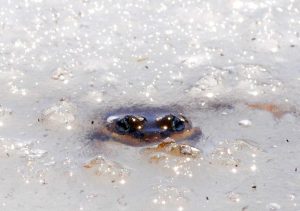Study predicts warmer, drier mountains pose double whammy for cold-adapted amphibians
By Simon Fraser University
1/25/2019
 A species of frog endemic to the Pacific Northwest faces a 50 per cent increase in the probability of extinction by the 2080s due to climate change, according to a new study published by SFU researchers.
A species of frog endemic to the Pacific Northwest faces a 50 per cent increase in the probability of extinction by the 2080s due to climate change, according to a new study published by SFU researchers.
The mountain-dwelling Cascades frog thrives in extreme climatic conditions, ranging from dozens of feet of snow in winter to temperatures in excess of 90°F in summer. Cascades frogs are explosive breeders and their role as predators of flying insects is critical to aquatic and terrestrial ecosystems.
SFU biologist Wendy Palen, along with co-authors Mike Adams of the United States Geological Survey and Maureen Ryan and Amanda Kissel of Conservation Science Partners, set out to understand the effects of climate change on these unique amphibians.
Specifically, they aimed to assess how the warmer and drier temperatures occurring with climate change affect the survival of two distinct aspects of the frog’s life cycle: in the aquatic stage where the frogs develop as tadpoles in shallow ponds, and in the terrestrial environment stage where they live as adults.
Read more here: http://www.sfu.ca/sfunews/stories/2019/01/warmer-drier-mountains-double-whammy-for-cold-adapted-amphibians.html